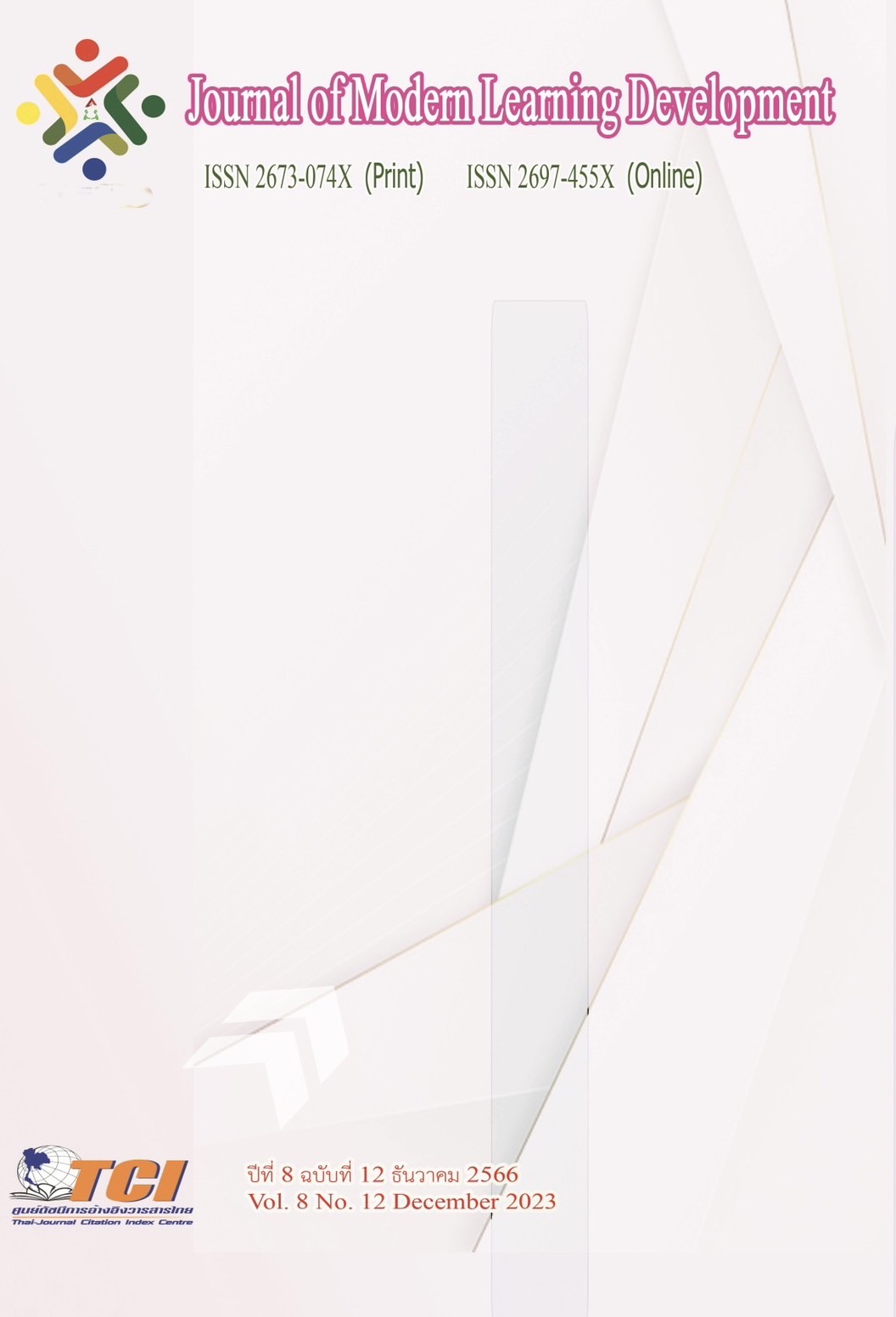THE EFFECT OF ORGANIZATIONAL COMMITMENT AND CONFLICT MANAGEMENT STLYE TO JOB PERFORMANCE OF A VACCIEN MANUFACTURER EMPLOYEE IN GATEWAY INDUSTRIAL ESTATE, CHACHOENGSAO PROVINCE
Main Article Content
Abstract
The objectives of this research were to study 1) The Effect of Organizational Commitment and 2) Conflict Management Style to Job Performance of a Vaccine Manufacturer Employees in Gateway Industrial Estate, Chachoengsao Province. It is quantitative research by using survey research method. Population of this study is comprised 125 employees. The number of sample is calculated from Krejcie & Morgan formular. 108 Employees are response. Sampling method is accidental sampling. Research questionnaire is used for collecting data from the target sample for analyze the frequency, mean, percentage, standard deviation and hypothesis were tested by multiple regression analysis.
The results of the research found that 1) Affective commitment and Normative commitment are significant positive effect on job performance of employee in Gateway Industrial Estate, Chachoengsao Province (p = 0.05). And 2) Conflict management style Collaboration and Accommodation are significant positive effect on job performance of employee in Gateway Industrial Estate, Chachoengsao Province (p = 0.05).
Article Details
References
กรมควบคุมโรค (2563). โรคติดเชื้อโคโรนา 2019 (COVID-19). สืบค้นเมื่อ 16 มกราคม 2564 จากhttps://ddc.moph.go.th/viralpneumonia/ind_world.php
คณิต เรืองขจร. (2557). การบริหารความขัดแย้งในองค์กรที่มีอิทธิพลต่อผลการปฏิบัติงาน: กรณีศึกษา บุคคลากรคณะบริหารธุรกิจ มหาวิทยาลัยเทคโนโลยีราชมงคล ทั้ง 4 แห่ง. (Doctoral Dissertation, มหาวิทยาลัยเทคโนโลยีราชมงคลธัญบุรี. คณะบริหารธุรกิจ. วิชาเอก การจัดการทั่วไป).
ณิชา เกตุงาม และ อัควรรณ์ แสงวิภาค. (2562). ภาวะผู้นำแบบการเปลี่ยนแปลงและความผูกพันต่อองค์การที่มีผลต่อประสิทธิภาพในการปฏิบัติงานของพนักงานปฏิบัติการอุตสาหกรรมเหล็กบางสะพาน จังหวัดประจวบคีรีขันธ์. รายงานการประชุม Graduate School Conference Vol. 3, No.1, หน้า 332 – 340.
นันทนา จงดี. (2560). แรงจูงใจตามทฤษฎี ERG และความผูกพันองค์กรของพนักงานที่มีอิทธิพลต่อผลการปฏิบัติงาน: กรณีศึกษาบริษัทผลิตรถเด็กเล่นแห่งหนึ่งในจังหวัดปทุมธานี. การค้นคว้าอิสระปริญญาบริหารธุรกิจมหาบัณฑิต สาขาวิชาการจัดการทั่วไป คณะบริหารธุรกิจ, มหาวิทยาลัยราชมงคลธัญบุรี
ประเวศน์ มหารัตน์สกุล. (2557). หลักการเขียนและวิธีการเขียนงานวิจัย วิทยานิพนธ์ สารนิพนธ์. สำนักพิมพ์ปัญญาชน, กรุงเทพ. 182.
ประสพชัย พสุนนท์. (2559). ความเที่ยงตรงของแบบสอบถามสำหรับงานวิจัยทางสังคมศาสตร์. วารสาร สังคมศาสตร์ มหาวิทยาลัย ศรีนครินทรวิโรฒ, ปีที่ 18.
สถาบันวัคซีนแห่งชาติ. ร่างนโยบายและแผนยุทธศาสตร์ ความมั่นคงด้านวัคซีนแห่งชาติ พ.ศ. 2563 – 2565
สำนักงานสภาพัฒนาการเศรษฐกิจและสังคมแห่งชาติ, กรกฎาคม 2563. แผนการฟื้นฟูเศรษฐกิจและสังคมจากผลกระทบของไวรัสโควิด-19 และ โครงการภายใต้กรอบวงเงิน 4 แสนล้านบาท ตาม พ.รก.กู้เงินฯ 1 ล้านบาท (รอบที่ 1). http://thaime.nesdc.go.th
อำนาจ ธีรวณิช. (2561). หลักการจัดการ. พิมพ์ครั้งที่ 3. บริษัทมาเธอร์ บอส แพคเก็จจิ้ง จำกัด, นนทบุรี: 446
Abdelmoula, L., and Boudabbous, S. (2021). Impact of Organizational Commitment on Accounting Professionals’ Performance: Case of Accounting Firms. Journal of Accounting, Business and Management, 28(2), 59-71.
Allen, N.J., and Meyer, J.P. (1990) The Measurement and Antecedents of Affective, Continuance, and Normative Commitment to the Organization. Journal of Occupational Psychology. 63(1), 1-18.
Bates, S., 2004. Getting engaged: Half of your workforce may be just going through the motions. HR Magazine, 49, 44-51
Bedarkar, M., and Pandita, D. (2014). A study on the drivers of employee engagement impacting employee performance. Procedia-Social and Behavioral Sciences, 133, 106–115.
Borman, W.C., and Motowidlo, S.J. (1997). Task Performance and Contextual Performance: The Meaning for Personnel Selection Research. Human Performance, 10(2), 99-109.
Campbell, J.P., and Wiernik, B.M. (2015). The modeling and assessment of work performance. Annual Review of Organization Psychology and Organizational Behavior. 2(1), 47-74.
Cesario. F., and Chambel, M. J. (2017). Linking Organizational Commitment and Work Engagement to Employee Performance. Knowledge and Process Management, 24(2), 152-158.
Gallup, A., Gallup, A.M., and Newport, F. (Eds.). (2006). The Gallup Poll: Public Opinion 2005. Rowman & Littlefield.
Kahn, W.A., (1990). Psychological conditions of personal engagement and disengagement at work. Academy of Management Journal, 33(4), 692-724.
Kell, H. J., and Motowidlo, S. J. (2012). Deconstructing Organizational Commitment: Associations Among Its Affective and Cognitive Components, Personality Antecedents, and Behavioral Outcome 1. Journal of Applied Social Psycholoby. 42 (1), 213 – 251.
Lee, C.C., Lin, Y. H., Huang, H.C., Huang, W.W., & Teng, H.H. (2015). The effects of Task Interdependence, Team Cooperation, and Team Conflict on Job Performance. Social Behavior and Personnality: an international journal, 43(4), 5229-536.
Meyer, J.P., & Allen, N.J. (1991). A three-component conceptualization of organizational commitment. Human resource management review, 1(1), 61-89
Rahim, M.A. (1985). A Strategy for Managing Conflict in Complex Organizations. Human Relations, 38(1), 81-89.
Rahim, M.A. (2001). Managing conflict in organizations. London: Qourum Books.
Rahim, M.A., Antonioni, D., and Psenicka, C. (2001). A Structural Equations Model of Leader Power, Subordinates’styles of Handling Conflict, and Job Performance. International journal of conflict management.
Robbins, S.P., and Judge, T. (2019). Principle of Organizational Behavior. 18th edition. United Kingdom: Pearson Education.
Stoyanova, T., and IIiev, I. (2017). Employee Engagement Factor for Organizational Excellence. International Journal of Business & Economic Sciences Applied Research, 10(1), 23-29.
Thomas, K. W. (1976). Conflict and conflict management. In M. Dunnette (Ed.), Handbook of industrial and organizational psychology, 889–935. Chicago: Rand McNally.
Thomas, K.W. (1992). Conflict and conflict management: Reflections and update. Journal of organizational behavior, 265-274.
Thomas, K. W. (1992). Conflict and negotiation processes in organizations. In M. Dunnette (Ed.), Handbook of industrial and organizational psychology, 3, 651–717.
Trudel, J. (2009). Workplace incivility: relationship with conflict management styles and impact on perceived job performance, organizational commitment and turnover. University of Louisville.


